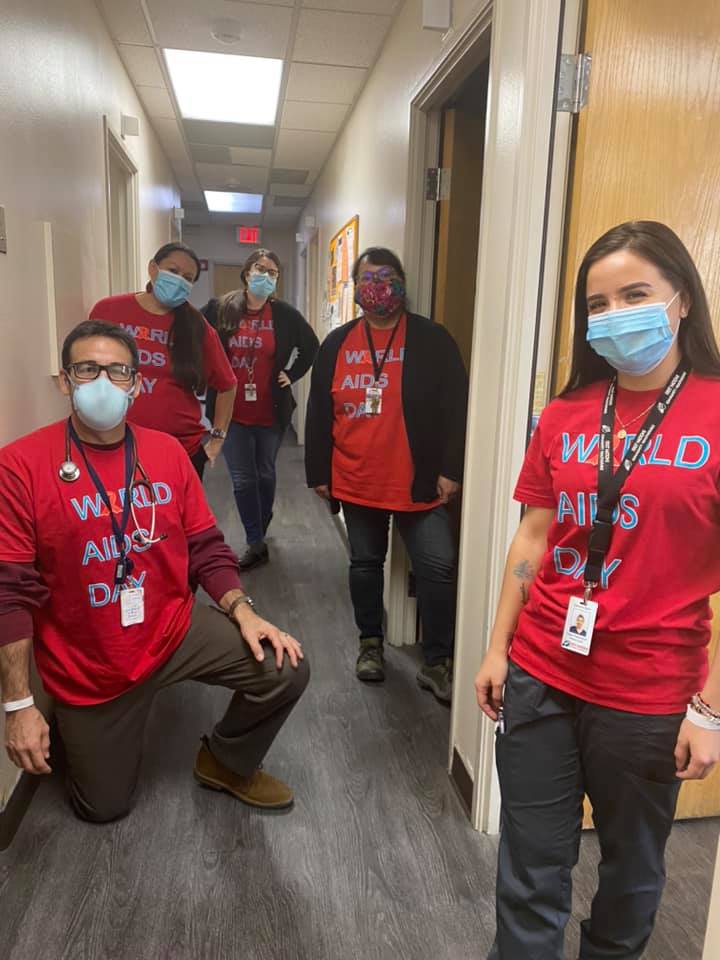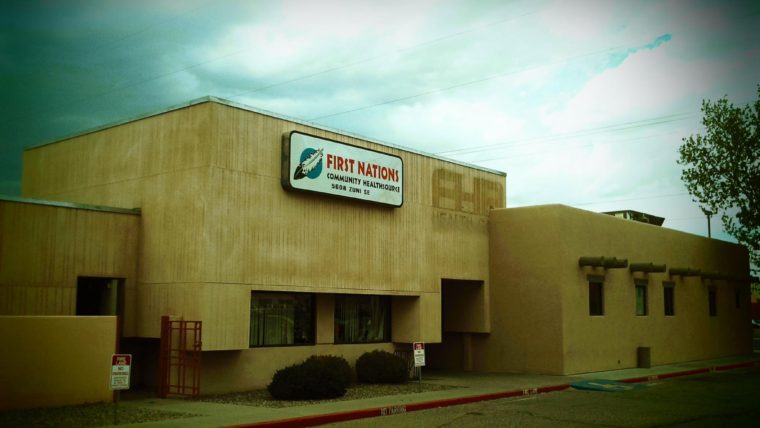(Featured image courtesy of First Nations Community HealthSource’s Facebook page.)
Each of the Urban Indian Health Institute’s (UIHI) “Spotlight Series” posts features one of the 41 Urban Indian Health Programs (UIHPs) across the United States. These interviews showcase each clinic’s HIV, hepatitis C, and STD services along with how each clinic is handling the COVID-19 pandemic. They allow UIHI to connect with UIHPs and celebrate the work they are doing for Indigenous people in urban areas across the country.
Today, we are proud to share the work that First Nations Community HealthSource (FNCH) is doing in Albuquerque, New Mexico. Our last post shared the Indian Health Board of Minneapolis’s story.
First Nations Community HealthSource Services (FNCH)

First Nations Community HealthSource prides itself on serving each client in a genuine way. Everyone is treated with respect and given access to as many resources as possible – both within the agency and in the surrounding Albuquerque area. The organization operates three clinics in Albuquerque, each of which offers wrap-around clinic and wellness services, ranging from traditional healing and sweat lodges to optometry and diabetes education.
According to Mattee Jim (Diné), the supervisor for FNCH’s HIV Prevention Program, FNCH is successful because of their reputation within their community.
“[We are] honest and real with our community,” said Mattee. “Knowing your resources within your agency and then also within your community is very beneficial. For us, we try to help the client as much as we can.”
Each of the clinic sites operates a comprehensive HIV/AIDS prevention and case management program which provides thorough support and care for their participants.
In order to remain open so that community members can still access their necessary services during the pandemic, FNCH has adapted and remained flexible. They have introduced standard safety protocols to keep their staff and patients safe during the COVID-19 pandemic. Starting last spring, they have required mandatory masks, temperature checks, and COVID-19 symptom screening questions for everyone who enters the clinic. While inside the clinic, everyone must always respect social distancing rules and maintain a minimum distance of six feet from each other whenever possible. They keep their community updated on the latest COVID-19 safety guidelines and protocols on their Facebook page.
Certain programs, like the food pantry for people living with HIV, have needed to adapt to the new safety protocols. FNCH’s food pantry is now only accessible outside of the clinic. Anyone who wishes to access the pantry is screened for COVID-19 symptoms, including a temperature check. Staff sanitize all products and packaging before placing selected items in a bag for each person to take home. Social distancing measures are followed throughout this process, as with all other services in FNCH’s three clinics.
HIV/AIDS Prevention and Case Management at FNCH

All three of FNCH’s clinics offer a variety of services as part of their HIV/AIDS prevention and case management programs intending to reduce harm, prevent overdose, and provide safe, confidential spaces for workshops, counseling, and testing. These services include free rapid HIV testing and counseling, referrals to syringe exchanges, workshops for Native women, and workshops for people living with HIV/AIDS. Their HIV/AIDS program also runs the HIV Services Program (HSP) which provides medical and non-medical case management services for people living with HIV/AIDS statewide.
A highlight of FNCH’s HIV services is their in-depth case management, offering holistic care and support ranging from employment support to healthy meal planning. Case managers focus on building a plan and developing goals with each client, including individual career goals and employment options. The clinic offers computer access for program participants to create resumes and apply for jobs online.
“Our case manager works with each client in developing goals related to working again,” said Mattee. “A lot of times people living with HIV are not working or are unemployed because of status.”
In the past, FNCH case managers have offered a few workshops on healthy diets and exercise, but with COVID-19, these workshops were put on hold. Other food services which were paused due to the pandemic, including a mobile farmer’s market which came to FNCH sites weekly and accepted food stamps.
All of FNCH’s workshops offer prevention resources in the context of traditional Diné practices and medicine, honoring the history and medicine of the Diné people:
“Within our Diné culture, drinking sage is a part of healing,” shared Mattee. “A lot of the Elders say to drink sage to help with your immune system, especially with the COVID pandemic that’s going on. The medicines that we drink and the medicines that we utilize in ceremonies are very powerful. Combining that with the holistic approach and the mentality of it brings that strong balance that we need in our lives.”
These workshops created for participants in HIV prevention program cover topics such as healthy relationships and how to communicate with loved ones about having HIV. In response to COVID-19, The HIV prevention team at FNCH is exploring ways to offer virtual versions of these workshops for Native gay men and Native transgender women living with HIV.
A Community Effort: Support from Local Organizations
The HIV prevention work that FNCH does is supported by other local organizations, including the New Mexico HIV Community Planning and Action Group and the Southwest Indigenous Initiative. Both groups are based in Albuquerque, New Mexico and provide support and resources to those living with HIV.
The New Mexico HIV Community Planning and Action Group supports HIV prevention and case management services for the state. Formed in 1995, the group meets every month to conduct mandated community-based HIV prevention planning as a HIV planning group for grants from the Federal Centers for Disease Control and Prevention (CDC), Division of HIV/AIDS Prevention (DHAP). Mattee helps lead these group meetings, where community members gather and share prevention resources and updates with one another. They work to ensure that New Mexicans living with HIV receive access to HIV care services, such as medical care and medications, testing and referral services, condom distribution, HIV counseling, and partner services.
The Southwest Indigenous Initiative brings people together to share resources on Indigenous HIV prevention, sexual and reproductive health education, and harm reduction. One major strength of this group’s work is their online presence which reaches beyond the borders of New Mexico to include tribal members from the entire Southwest region, an important distinction as tribes do not necessarily fall neatly within the boundaries of a state. The Navajo Nation, for example, stretches across Arizona, Utah, and New Mexico. The Southwest Indigenous Initiative invites community members from all three states.
A Team Effort
It’s not just Mattee working hard behind the scenes, however. When asked, she gave credit to her staff for helping the FNCH HIV Prevention Program become so encompassing.
“My staff does a phenomenal job. I have to give kudos to them because they do the frontline work! Their ideas are supported in what they want to do and how they want to approach things,” said Mattee. “I come from the prevention working perspective. Even though I supervise a program, I like getting ideas from our employees on what they want to do, and I work to support that. It really brings good focus into the program that you run!”

For more information on First Nations Community HealthSource (FNCH), please visit their website. You can also find them on Facebook.
Thank you to Mattee and First Nations Community HealthSource (FNCH) for your amazing work with the community!

